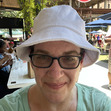Donalyn Miller's Blog, page 16
February 25, 2009
Waiting to Exhale
“If you want to be a writer,” Stephen King says, “you must do two things above all else: read a lot and write a lot.” Reciprocal processes, reading and writing naturally fit together. The most prolific readers are the best writers, and my students and I write every day, as well as read. We inhale rich, powerful language, gain sustenance from it, and create our own ideas. We must read so we can write, and we must write so we have more to read.
This week, we are analyzing excerpts from our favor
February 11, 2009
Expert Readers Wanted
It is flu season, and on the days when I look out to see seven empty desks, I am grateful to be a language arts teacher. Reluctant to start new material when up to a third of my students are out sick, I know that no day is wasted. We can always move forward by reading and writing.
Today, my students work diligently on their book reviews. Looking at published examples from Booklist and Publishers’ Weekly, we previously developed a list of criteria we noticed professionals use like information ab
January 28, 2009
Ending Readicide
A recent post from NYC Educator recounts an exchange with students about reading and how much they hate it. It is not hard to see the connection between this conversation and Readicide: How Schools are Killing Reading and What You Can Do about It, Kelly Gallagher’s newest book. I mentioned Readicide in my last post and invited readers to check out Kelly’s book and post questions about it.
I am not a big reader of books on the Web, preferring to curl up with the paper version, but I read Readic
January 13, 2009
Parents: Reading Role Models or Victims of Readicide?
Last week, the Department of Education released its latest report about the state of reading in America. Results, estimated from the 2003 National Assessment of Adult Literacy (NAAL), indicate that 32 million adult Americans lack fundamental literacy skills. Leaders in adult literacy education cite undiagnosed learning disabilities, immigration, and high school dropout rates as factors, but illiterate adults are not the only ones who aren’t reading. An oft-quoted 2007 Associated Press Poll found
December 31, 2008
Reading Rabbit Holes
With the holiday break winding down (we have to report back to school on Friday for staff development), I am in work-avoidance mode. Instead of taking down my Christmas decorations, lesson planning or writing, I decided to clean out the bookmarks in my computer under the guise of doing something productive. After two hours, I realized that I had fallen into the rabbit hole, the colorful, magical, random world that so often sucks me into the Internet. I have some gems in the rabbit hole—Websites
December 17, 2008
New Take on the Newbery
Each winter, the children’s literature world debates the upcoming Newbery Awards, the annual honor given each January by the American Library Association for the best children’s books of the previous year. Scores of book bloggers create Newbery shortlists predicting the winners, while libraries across the country host mock Newbery committees. Discussing the timeless appeal and literary merit of the books we read is an authentic pastime for readers, but this year the importance of the Newbery Awa
December 3, 2008
No Twilight for Reading
Eight English teachers, surrounded by hundreds of teenagers, stand in line behind velvet ropes. Everyone wears black, sporting t-shirts bearing slogans like, “And so the lion fell in love with the lamb,” and “Edward prefers brunettes.” Two girls, in matching Cullen Crest jackets, snap pictures of the crowd with their cell phones.
When the theater doors finally open, my friend Jennifer, the head of her high school English department, zigzags forcefully through the crowd and secures us a row of
November 18, 2008
Lowering the Bar
I have radar for kids that read a lot. Kids who read while walking down the hall—noses buried in The Odyssey or The Warrior Heir, kids who pester our librarian daily for the latest sequel in a beloved series, kids who lug books to the principal’s office, the bus line, or the lunchroom— I see avid readers everywhere. Perhaps I recognize kindred spirits, readers for whom books are a natural extension of themselves and who cannot spend a day without reading. I was this kind of reader in school. You
November 4, 2008
Readers Seek Their Own Level
It takes some of my students longer than others to fall in love with books, so it cheered me last week to see Bobby checking out all six books in Gordon Korman’s action-packed On the Run series. Bobby, a developing reader, has had a bit of trouble finding books that he enjoys. Sidling up to him, I said, “Wow, it seems like you are really making some reading plans. What interests you in reading On the Run? I know that a lot of kids in the class love it.”
Looking guilty, Bobby asked, “May I chec



